Home, Community and School Vegetable Gardens: Nutrition-sensitive Food System Intervention for Changing Rural and Urban Livelihoods in East and Southeast Asia

As populations continue to shift from rural to urban areas in East and Southeast Asia, increasing and
changing demands for food will have strong but unpredictable effects on rural and urban livelihoods. East
and Southeast Asia have achieved significant economic progress in the past three decades, but this progress
has not translated into improved nutrition in several countries in the region. While these countries continue
to deal with the problems of infectious diseases and undernutrition, such as deficiencies in energy, protein,
essential vitamins and minerals, they are at the same time experiencing an upsurge in noncommunicable
disease risk factors such as obesity and overweight, particularly in rapidly growing urban areas. Ensuring
safe, nutritious and culturally appropriate food is available, accessible and affordable year-round is a
pressing concern, and the situation is aggravated by climate change, which poses a major risk for the
region and exacerbates existing development problems such as population growth, rapid urbanization,
increasing competition for natural resources, and environmental degradation.
Agriculture, nutrition and health are intrinsically linked with significant implications for the prosperity
of people, especially for the poor and other vulnerable groups. Negative health impacts can be minimized
by reducing environmental health risks, while at the same time improving nutrition. Vegetable gardens
can improve food and nutrition security in the region, generate additional income, contribute to better
health, and promote gender equity. Home and community gardens can provide a variety of fruits and
vegetables throughout the year, thus contributing significantly to a nutritious diet for family members, and
also offering opportunities for income generation through sale of extra produce. School gardens encourage
the production and consumption of a diversity of vegetables and fruit, which is particularly important
when persuading children to favor a balanced and nutritious diet as part of a healthy lifestyle. Schoolbased
approaches to implement health and nutrition programs are considered effective since the existing
infrastructure of the educational system can often offer a more cost-effective route for delivery of health
and nutritional interventions than the health system can. The paper discusses examples of home, community
and school garden interventions in the region, including success stories and failures, and closes with a set
of recommendations for scientists, extension workers and policy makers to harness the potential of these
gardens as a nutrition-sensitive food system intervention for changing rural and urban livelihoods in East
and Southeast Asia.
| 刊行年月日 | |
|---|---|
| 作成者 | Robert J. Holmer |
| 著者キーワード |
sustainable diets climate-smart horticulture resilience community-based urbanization |
| 公開者 | Japan International Research Center for Agricultural Sciences |
| オンライン掲載日 | |
| 号 | 2013 |
| 開始ページ | 166 |
| 終了ページ | 178 |
| 権利 | Japan International Research Center for Agricultural Sciences |
| 言語 | eng |
